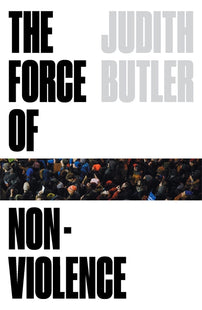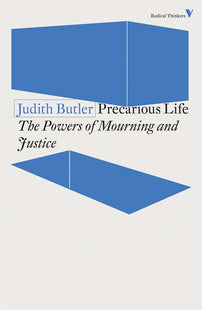Capitalism Has its Limits
Judith Butler discuss the COVID-19 pandemic, and its escalating political and social effects in America.

The imperative to isolate coincides with a new recognition of our global interdependence during the new time and space of pandemic. On the one hand, we are asked to sequester ourselves in family units, shared dwelling spaces, or individual domiciles, deprived of social contact and relegated to spheres of relative isolation; on the other hand, we are faced with a virus that swiftly crosses borders, oblivious to the very idea of national territory. But not everyone has a household or a “family” and increasing numbers of the population in the US are homeless or transient. So “the household” is figured as a space of protection, but that is hardly true for many people. In the US, a national strategy is formulated, rescinded, and appears in confused public forms. And the question of who will live and who will die seems to our President as a cost-benefit problem that the markets will decide. Under such conditions, how do we post the question of what consequences this pandemic will have for thinking about equality, global interdependence and our obligations toward one another? After all, the virus does not discriminate. We could say that it treats us equally, puts us equally at risk of falling ill, losing someone close, living in a world of imminent threat. The virus operates within a global framework, but what about the rest of us? By the way it moves and strikes, the virus demonstrates that the global human community is equally precarious. At the same time, however, the failure of some states or regions to prepare in advance (the US is now perhaps the most notorious member of that club), the bolstering of national policies and the closing of borders (often accompanied by panicked xenophobia), and the arrival of entrepreneurs eager to capitalize on global suffering, all testify to the rapidity with which radical inequality, nationalism, and capitalist exploitation find ways to reproduce and strengthen themselves within the pandemic zones. This should come as no surprise.
The politics of health care in the US brings this into relief in a distinctive way. One scenario we can already imagine is the production and marketing of an effective vaccine against COVID-19. Clearly eager to score political points that will secure his reelection, Trump has already sought to buy (with cash) exclusive US rights to a vaccine from a German company, CureVac, funded by the German government. The German Health Minister, who could not have been pleased, confirmed to the German press that the offer was proffered. One German politician, Karl Lauterbach, remarked: "The exclusive sale of a possible vaccine to the USA must be prevented by all means. Capitalism has limits." I presume he objected to the “exclusive use” provision and would be no more pleased with the same provision, were it to apply to Germans only. More recently, Trump made a deal with Gilead Sciences, a pharmaceutical corporation, which grants them exclusive rights to developing Remdesivir, a drug with potential to treat the COVID-19 virus. Inviting Walmart and CVS to the White House to come up with solutions not only reveals a mistaken understanding of how new medical treatments are developed, but confuses business with public health in some rather consequential ways. Just days ago, Trump made clear that the financial health of the nation is its true health, and that the only relevant measure is Wall Street. As a result, returning to “business as usual” even if it means risking increased mortality rates from the virus, is justified in his view. The clear implication is that it is alright of the most vulnerable people die – the elderly, the homeless, those with preexisting conditions – as long as the economy can be revived. The nation is not its people, but only its markets.
It makes no sense to ask again, what is Trump thinking? The question has been posed so many times in a state of utter exasperation that we cannot possibly be surprised. That does not mean that our outrage lessens with every new instance of unethical or criminal self-aggrandizement. If he were successful in his effort to buy the potential vaccine and restrict its use to US citizens only, does he believe that US citizens will applaud his efforts, thrilled by the idea that they alone are delivered from a mortal threat when other nations are not? Will the US public really love this kind of nationalism? And if only the rich will have access to treatmentgs as they are delivered, are we expected to applaud this radically obscene social inequality, coupled as it is with market rationality and American exceptionalism? Are we expected to affirmed his self- described “brilliant” way of cutting a deal under such conditions? Does he imagine that most people think, that the free market should decide how the vaccine is developed and distributed? Is it even thinkable within his world to insist upon a world health concern that should transcend market rationality at this time? Is he right to presume that the rest of us live within the parameters of his imagined world? Even if such restrictions on the basis of national citizenship do not come to apply, we will surely see the wealthy and the fully insured rush to secure access to any such vaccine when it becomes available, even if the mode of distribution guarantees that only some will have that access and others will be abandoned to continuing and intensifying precarity. Social and economic inequality will make sure that the virus discriminates. The virus alone does not discriminate, but we humans surely do, formed and animated as we are by the interlocking powers of nationalism, racism, xenophobia, and capitalism. It seems likely that we will come to see in the next year a painful scenario in which some human creatures assert their rights to live at the expense of others, re-inscribing the spurious distinction between grievable and ungrievable lives, that is, those who should be protected against death at all costs and those whose lives are considered not worth safeguarding against illness and death.
All this takes place against the US presidential contest in which Bernie Sanders’ chances of securing the Democratic nomination seem now to be very remote. The new projections that establish Biden as the clear front-runner are devastating during these times precisely because Biden once threatened to cut public funding for the elderly whereas both Sanders and Warren stood for Medicare for All, a comprehensive public healthcare program that would guarantee basic health care to everyone in the country. Such a program would put an end to the market-driven private insurance companies who regularly abandon the sick, mandate out-of-pocket expenses that are literally unpayable, and perpetuate a brutal hierarchy between the insured, the uninsured, and the uninsurable. Sanders’ socialist approach to healthcare might more aptly be described as a social democratic perspective that is not substantially different from what Elizabeth Warren put forth in the earlier stages of her campaign. In his view, medical coverage is a “human right” by which he means that every human has a right to the kind of health care that they require. Human rights tend to imagine the individual human as the point of departure. But why not understand health care as a social obligation, one that follows from living in society with one another? To compel popular consensus on such a notion, both Sanders and Warren would have had to convince the American people that we want to live in a world in which none of us denies health care to any of the rest of us. In other words, we would have to agree to a social and economic world in which it is radically unacceptable that some would have access to a vaccine that can save their lives when others should be denied access on the grounds that they cannot pay or could not secure insurance that would pay or because they lacked a visa or legal status.
One reason I voted for Sanders in the California primary along with a majority of registered Democrats is that he, along with Warren, opened up a way to re-imagine our world as if it were ordered by a collective desire for radical equality, a world in which we came together to insist that the materials that are required for life, including medical care, would be equally available no matter who we are or whether we have financial means. That policy would have established solidarity with other countries that are committed to universal health care, and so would have established a transnational health care policy committed to realizing the ideals of equality. The new polls emerge that narrow the national choice to Trump and Biden precisely as the pandemic shuts down everyday life, intensifying the precarity of the homeless, the uninsured, and the poor. The idea that we might become a people who wishes to see a world in which health policy is equally committed to all lives, to dismantling the market’s hold on health care that distinguishes among the worthy and those who can be easily abandoned to illness and death, was briefly alive. We came to understand ourselves differently as Sanders and Warren held out this other possibility. We understood that we might start to think and value outside the terms that capitalism sets for us. Even though Warren is no longer a candidate, and Sanders is unlikely to recover his momentum, we must still ask, especially now, why are we as a people still opposed to treating all lives as if they were of equal value? Why do some still thrill at the idea that Trump would seek to secure a vaccine that would safeguard American lives (as he defines them) before all others? The proposition of universal and public health reinvigorated a socialist imaginary in the US, one that must now wait to become realized as social policy and public commitment in this country. Unfortunately, in the time of the pandemic, none of us can wait. The ideal must now be kept alive in the social movements that are riveted less on the presidential campaign than the long term struggle that lies ahead of us. These courageous and compassionate visions mocked and rejected by capitalist “realists” had enough air time, compelled enough attention, to let increasing numbers – some for the first time – desire a changed world. Hopefully we can keep that desire alive, especially now when Trump proposes on Easter to lift constraints on public life and businesses and set the virus free. He wagers that the potential financial gains for the few will compensate for the increase in the number of deaths that are clearly predicted, which he accepts, and refuses to stop – in the name of national health. So now those with a social vision of universal health care have to struggle against both a moral and viral illness working in lethal tandem with one another.
Judith Butler is an American philosopher and gender theorist whose work has influenced political theory, philosophy, ethics, feminism, queer theory, culture, and the psyche. In her latest book, The Force of Nonviolence, she "makes an outsized argument: that our times, or perhaps all times, call for imagining an entirely new way for humans to live together in the world—a world of what Butler calls radical equality.” [New Yorker interview].
[book-strip index="1" style="display"]

